Footnotes of Mad Men: Full of Demands, Empty of Offerings
by Natasha Vargas-Cooper
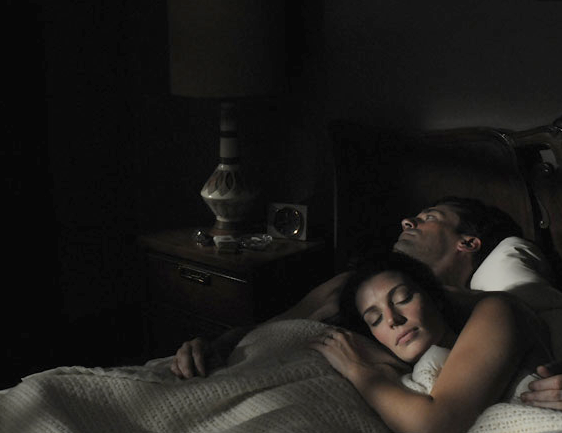
Don’s right-about one thing, at least: teenagers are sentimental. The cynicism with which adults rebel comes from the nihilism of doing what you know is bad for you because you’re old enough to understand that these things usually go unpunished. The kind of joyless self-indulgence that adults traffic in doesn’t exist for teenagers. For the young, it’s unfathomable that act of self-indulgence can bring anything but joy. In the twilight of childhood, you’re not sure what’s like to be an adult but you know what it feels like to not be a child. Every brush with adult behavior-anything from smoking, to sneaking out, to driving, to fucking-is wrapped in a gauzy, loving haze. (It’s bittersweet though: as the twilight of childhood dims, there is within the heart of every teenager a dull throb that comes with the mourning of lost innocence.) What’s alarming, then, is when grown-ups act like teenagers: denying themselves nothing, cherishing their transgressions like merit badges, constantly chasing the beginning of something, unable to parse the sensations of joys from despair.
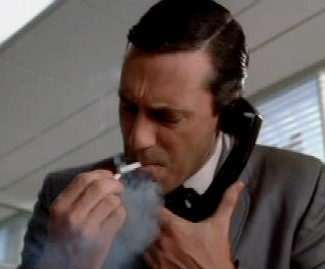
• At the close of season two, we see Don greeting the Pacific Ocean with his arms outstretched. Wading in Southern California’s baptismal waters, it seemed as though Don had found himself. But unlike prior visits, where Don has slinked out of the life he’d constructed on Madison Avenue, this time Don carried visible markings of his inability to conduct his life back home. There’s Don on a California poolside patio, one of the most informal settings in the world… wearing a hat and a tweed jacket. By 1965, this outfit was severely old-fashioned and out-of-date. But it’s not really a fashion faux-pas. It’s Don’s crisis: he’s so hermetically ensconced in his own emotional life and its decadent dramas that he seems to have lost that once-sure grip on the world around him.
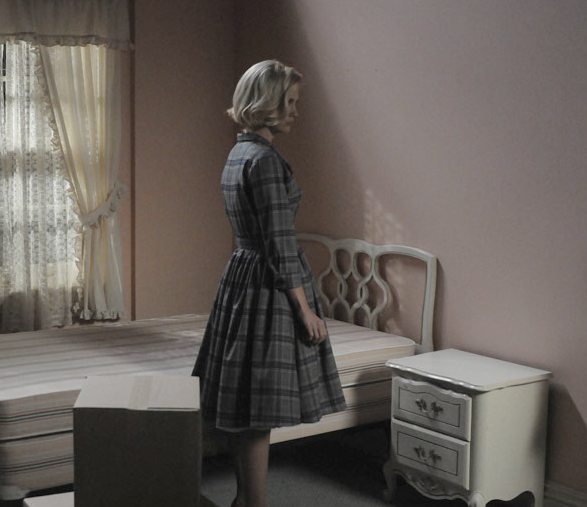
• Oh, Betty! We leave her sprawled out on Sally’s stripped bed after getting (at last) reprimanded by her husband for acting out (“There are no fresh starts!”). One of the problems posed by the increased spending power of middle class families in the post war era is that they could now access the services once reserved for the aristocracy-namely, servants! Is Carla a nanny or a cleaning lady? A babysitter? Betty once said she didn’t allow Carla to take the kids to the playground but does allow her to take young Sally to her shrink’s office. Before the economic boom, nannies and maids were worlds apart. The sole responsibilities of nannies was the care of the children-like Marry Poppins! Some were formally trained to be maternal surrogates, while maids kept the house in order. The two were separate and there was a whole Victorian caste system and social mores about dress, expectations and wages to keep the whole thing in place.
In Maud Shaw’s memoir about serving about serving as a nanny to Caroline and John Kennedy Jr., White House Nanny, she wrote, “The seven and a half years I was with her, [Jackie Kennedy] never as much asked me to pick up a pin for her. Even in the White House, she never once asked me to do anything that was not strictly within my province.”
While Betty is from money and had a close relationship with her own nanny, she hasn’t in her married life had the means to have a full-time live-in staff member. What you see transpire between Betty and Carla, with full-time, non-live-in domestic workers occupying the space between homemakers and housekeepers,creates the terrible and volatile dynamic that plays itself out in millions of homes today.
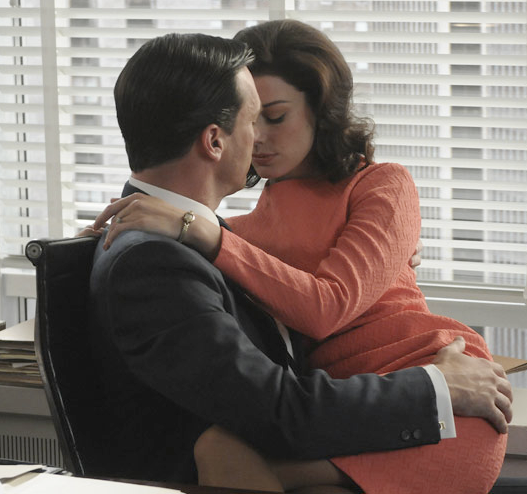
• In this season’s penultimate episode, Don sat across from Midge and asked her, in earnest, why she didn’t ‘just quit’ heroin. Her response later inspired Don to write his full-page-Times-ad tobacco letter. But we know something that Don may not have the wherewithal to recognize. He’s an addict too. When Don doesn’t have booze, and even sometimes when he does, he medicates with women.
In 1965, Life magazine did multi-page photo spread on two New York heroin junkies named John and Karen. Accompanying the shoot was James Mills’ famous account of life in Needle Park (it would later become The Panic in Needle Park, staring Al Pacino).
Almost all addicts are childishly immature; full of demands, empty of offerings. When they want something, they it want it yesterday, and they want it effortlessly. Nothing is their fault-the addiction, their degradation, their desperation…. Psychiatrists who have studied them over long periods know that most of them are extremely narcissistic, that their intense preoccupation with heroin is a surface manifestation of a more profound emotional preoccupation with themselves.
In his village apartment, Don’s fiancée sleeps in the crook of his arm. Outside, New York City is beginning to slip into one of its darkest periods. But not to worry. There’s a lovely haunted house in Ossining that just went on the market.
You can always find more footnotes by Natasha Vargas-Cooper right here, or, you know, you can get a whole book of ‘em.
Why We Need Books
“Many books are screwy, a great many are dull, some are irredeemable, and there are way too many of them, probably, in the world. I hate all the fetishistic twaddle about books promoted by the chain stores and the book clubs, which make books seem as cozy and unthreatening as teacups, instead of the often disputatious and sometimes frightening things they are. I recognize that we now have many ways to convey, store, and reproduce the sorts of matter that formerly were monopolized by books. I like to think that I’m no bookworm, egghead, four-eyed paleface library rat. I often engage in activities that have no reference to the printed words. I realize that books are not the entire world, even if they sometimes seem to contain it. But I need the stupid things.”
-Luc Sante discusses his book collection.
Milchtrinkers Uber Alles

Germany had a very interesting weekend. While an art exhibit exploring the wider cultural climate that allowed for Hitler’s rise to power opened at the German Historical Museum, Angela Merkel declared that the country’s attempt at multiculturalism had “failed utterly,” seemingly aligning herself with harder-right voices in the government that have reacted to a growing population of Middle Eastern Muslims by pushing for a tightening of immigration laws and enforcing a “dominant German culture.” And also, Der Spiegel’s Matthias Shulz wrote this great article on the recent findings of the “Leche” project-an international evolutionary biological study established “to genetically probe the beginnings of butter, milk and cheese”-that is oddly related to those first two things.
Sawing into human bones from the neolithic period, studying chromosomal evidence of lactose tolerance and the lack thereof, the scientists at the Leche project are changing long-held beliefs about European hunter-gatherer societies’ shift to sedentary agrarianism between 5,600 B.C. and 5,200 B.C. (And surely making milk the next comestible to get the “driving force of civilization” treatment in book form, like salt, cod, corn, sugar, etc.) Farming methodology-sowing seeds, milking cattle, etc.-was invented in the middle east, in the fertile crescent. Academics have long believed that it had been brought to Europe by small groups of wanderers and spread in what German archeologist Jens Lüning described as a spirit of “peaceful cooperation.”
Apparently, that was not the case. Rather, starting, around 7,000 B.C. Central Europe was flooded by a mass migration of middle-eastern farmers who brought their own livestock and did not intermingle or procreate with the area’s original inhabitants-in fact, there was violent conflict. As Shulz writes:
“The settlers, wielding their sickles, kept moving farther and farther north, right into the territory of backward peoples. The newcomers were industrious and used to working hard in the fields. Clay statues show that the men were already wearing trousers and shaving. The women dyed their hair red and decorated it with snail shells. Both sexes wore caps, and the men also wore triangular hats. By comparison, the more primitive existing inhabitants of the continent wore animal hides and lived in spartan huts. They looked on in bewilderment as the newcomers deforested their hunting grounds, tilled the soil and planted seeds. This apparently upset them and motivated them to resist the intruders.”
It turned out Europe’s lush vegetation and cooler climates suited diary farming well, and a population explosion among these original Middle Eastern immigrants seeded Europe with its healthy, strong-boned milk-fed future.
Writers Like Prizes
“In a perfect world, where the words you write are immediately found and lauded by those you write them for — the whole of humanity, no less — a prize would not be necessary. But since humanity is deaf, or just too busy to give a damn, and since there seems to be a disconnect between those who want to read a good novel and those who write them — as though the world of reading is one big lonely hearts club waiting for a matchmaker — there must be prizes to bring us together. In which case, yes, thank you, I would like to win one.”
–Booker Prize winner Howard Jacobson on awards and the winning of them.
Actress From The Pre-Irony Era Dies

“Her catchphrase — ‘Ward, I’m worried about the Beaver’ — became a slogan for an age without irony, before the social revolutions of the 1960s would change the way TV portrays the nuclear family forever.
-Poor Barbara Billingsley, having that line in her obituary. They didn’t even mention the jive scene! Rest in peace, America’s mom.
Let's talk about the finale of Mad Men!
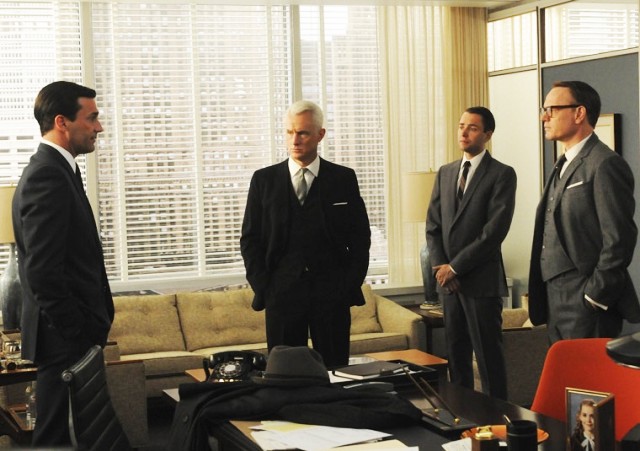
There will be plenty of excitement this evening at 10 PM Eastern when a pissy Peyton Manning scowls on the sidelines in our nation’s capital AMC airs the finale to Season 4 of “Mad Men.” While the redoubtable Natasha Vargas-Cooper will of course be brining you your weekly installment of Footnotes tomorrow, the way our shared cultural heritage works these days is that everyone watches something and immediately jumps on the Internet to talk about it. (Sometimes they even do so during the event.) So we may as well set up a water cooler (your choice if beverage may vary) right here in anticipation. See you later on this evening. Feel free to smoke.
Sympathy for the Bullies: Our New Villains
by Mike Barthel
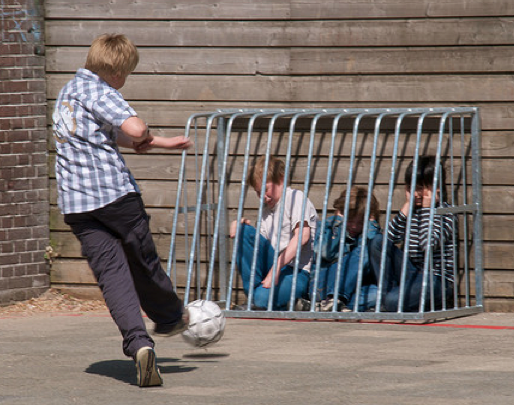
Pity the poor bullies: it is not easy being the cultural villain of the moment. (Just ask Mexicans, or Muslims!) The Google Trends spike over the last year for “bullying” is impressive, and it’s all around us: the car ad that was recut to change a kid fleeing bullies into merely a friendly race between youngsters; the members of the Westboro Baptist Church being described as bullies (rather than, say, insane bigoted cultists, which would apparently be less damning!); and, of course, the Times Styles section on bullying in kindergarten. The government’s Secretary of Education threw a “Bullying Prevention Summit”! There’s a “Stop Bullying Now!” program! 45 states have anti-bullying laws! And so all this attention either reflects or has caused a shift in the connotation of the word “bully.” Calling someone a bully now has the kind of rhetorical force that it seems less like a description and more like an indictment that must be answered. It’s not just an accusation; it’s an identification of imminent threat. That’s new. And looking at how we came to hate bullying provides a case study in how cultural attitudes and debates slowly change-and also makes me wonder if we shouldn’t be a little more leery in how we choose to assign blame.
It was never really good to be a bully, but they used to be seen more as a fact of life, like getting shit on by a bird. Bullies were the thing that necessitated stalwart heroes to protect the weak. (See also: the Team America theory of geopolitics.) Then came the school shootings of the 90s, which were interpreted as, among other things, the result of bullying. This changed bullies from harmless thugs to the precipitants of picked-upon teens going on homicidal rampages. And in the past few years, stories of “cyber-bullying” (cyber!) cases changed the equation by making the targets of bullying victims instead of merely threats. The most visible recent examples, of course, involve gay teens killing themselves after being bullied. That increases the perception that bullying is not just something vaguely unpleasant that you have to deal with, but a threat to the survival of our loved ones.
The equation, then, is this: bullying is bad not because it’s unpleasant to endure or because it can screw you up psychologically, but because it can result in teenagers killing themselves. But there’s a sense that something’s changed, that there’s something new here-even though of course teenagers have always killed themselves, and probably sometimes because of bullies. We have statistics! One particularly well-established statistic is that the suicide rate for gay teenagers is several times the rate of that for straight teens. We know this because some people have been talking about gay teen suicide for a long time. What’s interesting, though, is that the statistics have come to mean different things at different points in that debate. Today, the higher suicide rate among gay teens is being used by gay-rights advocates to show the increased risk of teens to bullying, and is effective enough that anti-gay groups feel the need to question it.
But a few short decades ago-and even sometimes now, this same statistic was used to support arguments that homosexuality was a kind of mental illness (as it was officially classified by the American Psychological Association until 1973). Suicide was seen as a sort of co-morbid symptom of homosexuality, another sign-like gays’ well-known proclivities for cultural deviancy, tragic personal lives and difficulty maintaining romantic relationships-that homosexuality was a sort of disease that some were just deciding not to treat. The higher suicide rate played into this: if homosexuals keep committing suicide, it must be because they are all crazy. (Rather than, say, because people were awful to them.) It’s an effective enough argument that, yes, some people are still making it, but that seems far more fringe now.
So the statistic didn’t change-the facts didn’t change-but the power those facts hold now runs to the other side of the equation, in favor of gay rights, instead of against them.
How did this come about? Well, a few things shifted. First, many people stopped seeing homosexuality as a choice, and so the bullying wasn’t the victims’ “fault” anymore. At the same time, many of us became far more understanding of mental illness as a medical condition (so that suicidal depression, for instance, was seen as something to be treated), and also many became far less tolerant of overtly threatening or predatory behavior as the rights of women and minorities became more culturally cemented. Being an asshole is now a lot less acceptable in American culture, unless you are British and on a reality show. And now, it’s all filtering down to schools and children. Which is good! But what do we do with the assholes?
Let me tell you a story. In fifth grade, I was being bullied by this boy named Jason. As a weird little kid, I was not new to this sort of thing, but this experience was particularly shitty. It was one of those situations that you particularly must endure as a child, where you can’t choose to avoid the person who’s tormenting you. Jason was awful to me and yet I had to see him on a regular basis both at school and at Cub Scouts, where his mom was our den leader. It made me miserable. But after a lot of thought (of course!), I decided I was going to stand up for myself the next time the opportunity presented itself. That opportunity happened to be when we were taking our class photo. While getting lined up in the back row, Jason jostled me, and I responded by giving him a bloody nose.
I faced no disciplinary action for this. As I recall, I got a subtle nod of approval from my teacher. I did, however, get a reaction from one of the other kids. During a lull in class, a guy named Dave showed me a piece of loose leaf paper, on which was written a list of all the people in our class. “This is the list of who’s most popular,” Dave explained, and pointed to my name: “See? You moved up.” And indeed, there I was, now four spaces from the bottom of the list rather than two. And at the very bottom was Jason.
I’m pretty sure that was the exact moment I decided that popularity was stupid, an attitude that would cause me no small amount of trouble later in life.
But it also drove home that, as scary as bullies are, they’re not exactly society’s winners. Unless we’re prepared to say that a ten-year-old kid deserves to be a loser and has permanently entered a class of loser-hood by his own fully-informed choice-entering a class that may run him up one side of the criminal justice system and down the other-then we have to be willing to entertain the prospect that people like Jason ended up on the bottom rung perhaps through some situations that were not entirely of their own making.
Of course, this thought was of little comfort when I spent most of middle school hiding from a whole different group of dudes that were awful to me.
And where is Jason today? Well, the one web hit I turned up is… a picture of my former tormentor in SWAT gear, participating in a simulated takedown of a school shooter. I kid you not: this is true. If I were making it up, I would be the first to condemn it as psychologically simple-minded, but reality has given the lie to complex art yet again. Of course the bully ended up as a cop! Of course he is training to deal with the consequences of his own bullying! Oh, how neat and tidy.
So, okay. Maybe we shouldn’t have too much sympathy for bullies. But at the same time, there are some problems with the current rhetorical climate. For one thing, ,” and the widespread use of that phrase-even by people with the best of intentions!-says depressing things about our inability to deal with a social problem without perceiving ourselves as floating in some ahistorical moment. And we’ve been through this sort of hysteria before. Think of Heathers, the comic masterpiece about adolescence and suicide that makes a good case for the dangers of a John Hughes morality. Adults like to think that teenagers are innocent creatures, free of sin, and that if we could just remove all pressures on our precious youth, they could frolic in peace. That’s one theory! But there are others, too.
As much as we feel like we’re doing good by painting a Hitler mustache on bullies, it’s not like it’s a problem that no one was aware of before. And one that wasn’t, at least mildly, improving. There’s no evidence that going to these rhetorical extremes will force improvements any more quickly than what people are already doing to fight the problem-whereas there’s ample evidence that allowing ourselves to think about social ills with a crisis mentality degrades our ability to embrace the difficult, gradual solutions that most long-standing problems actually require. We paint social conflicts in these terms only because we can’t stand the thought that we might not be doing everything we can to make things better for everyone.
Meanwhile, we’re telling kids that it gets better. Which means we’re pretending that adults are far less terrifying creatures. I’ve known enough friends who’ve gotten gay-bashed as adults that I know bullying doesn’t stop at graduation, and that seems like a far bigger issue. (Technically speaking, I once got my nose broken for being gay, but that’s a story for another time.) It’s hard to escape the feeling that things like Dan Savage’s “It Gets Better” project, National Coming Out Day, and this nightmare have only been successful because they make straight people such as myself feel better about ourselves, like we are doing something to help the cause of equality, even though we’re not really doing anything substantial.
They may make us tear up, but it also makes gay people into Sanrio dolls for the enjoyment of the straights-cuddly creatures who, like John Hughes characters, are pure of heart. That’s better than being seen as child molesters, but it still seems unproductive. And on one level, anti-bullying campaigns are just one more way to delude ourselves that human cruelty is something we can overcome.
In a few months, when the media (whether “mainstream” or LiveJournal) have all forgotten about Bully Crisis 2010, the people who were working before to improve things one interpersonal interaction at a time will still be at it, and will still be making a difference. Making the world a better place is mostly a small, boring affair. Those tiny but persistent efforts, that slow stacking of brick upon brick, is the only way we might approach an attainable semi-utopia: one in which teenagers might still sometimes kill themselves, but at least gay teens don’t do it any more than straight teens do.
Mike Barthel has written about pop music for a bunch of places, mostly Idolator and Flagpole, and is currently doing so for the Portland Mercury and Color magazine. He continues to have a Tumblr and be a grad student in Seattle.
Photograph from Flickr by Thomas Ricker.
Pregnant Stomach Resembles Buttocks, Say Floridians
To quote the great Barry Gifford’s concluding line in the novel Arise and Walk, “I got no doubt in my mind but that there ain’t never been and won’t never will be another country like this one in the history of planet earth.”
The "Bad Dad, Good President" Theory

I have been sort of developing this theory on modern presidencies and how the successful ones have all been held by men with distant or completely absent fathers, while the failures were men who came from stable and prosperous upbringings.
Reagan’s dad was a drunk and Clinton’s dad died before he was born (and his stepfather was abusive), while Jimmy Carter’s father was a successful businessman and member of the state House, George H.W. Bush’s dad was a senator, and, as it turns out, George W. Bush (who did at least serve two terms, although I can’t think of anyone who is calling that a successful presidency — yet) is the son of George H.W. Bush. Obviously this model works in Barack Obama’s favor, but with all the bad breaks the guy has caught, who the hell knows?
As I say, it’s just a theory. I have a feeling that if it holds up at all it has something to do with resilience and the ability to create your own narrative. Anyway, in researching this hypotheses to make it more plausible, I came across this, which seems to indicate that Jimmy Carter’s father was actually Joe Kennedy. Which totally screws over my postulation. Back to the drawing board, I guess.
Man Kicks Tomato In Head
And then there’s this: “A former city mayor was ruing an expensive slip-up today after his failure to vault a giant human tomato cost his council £24,000. Jim Rodgers accidentally kicked Belfast City Council employee Lorraine Mallon in the head in a publicity stunt that went spectacularly wrong. Ms Mallon, who was dressed up as the huge fruit for a photo shoot to promote a gourmet food fair, suffered a slipped disc in the ill-fated leap.” Please click through for the photo of “the rueful moment Jim Rodgers attempted to jump a vegetable-themed employee”
